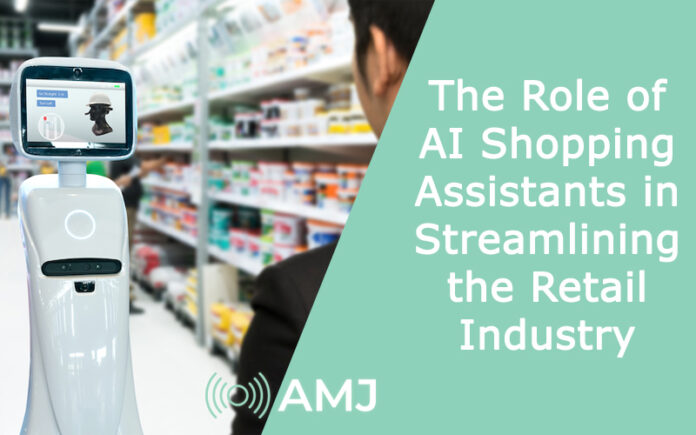Artificial intelligence (AI) shopping assistants have emerged as a powerful tool in streamlining the retail industry. These assistants leverage machine learning algorithms to provide personalized recommendations, optimize inventory management, and enhance the overall customer experience. By analyzing vast amounts of data, AI shopping assistants can identify trends and patterns that humans might miss, making it easier for retailers to anticipate consumer demand and adjust their strategies accordingly.
Additionally, these assistants can help retailers automate routine tasks such as product categorization, pricing, and order tracking, freeing up staff to focus on other critical areas. As technology continues to evolve, AI shopping assistants will become even more sophisticated, enabling retailers to stay ahead of the competition and deliver exceptional service to their customers. To know more, visit decoder.com.
Contents
How AI Shopping Assistants Streamline the Retail Process
AI shopping assistants are revolutionizing the retail industry by streamlining the shopping process and providing an enhanced customer experience. These assistants use machine learning algorithms to learn about customer preferences and suggest products based on their past purchases and browsing history. This not only saves time for customers but also increases sales for retailers by providing personalized recommendations.
Automation and Efficiency Gains
AI shopping assistants can automate repetitive tasks such as product categorization and pricing, freeing up staff to focus on more value-added activities. These automated processes make it easier for retailers to manage their inventory and keep track of orders. AI also enables retailers to respond quickly to customer inquiries, ensuring that customers receive an excellent service experience.
Improving Customer Experiences
AI shopping assistants can also help retailers provide better customer experiences by delivering personalized recommendations and customized offers. By analyzing data from customers’ past purchases, AI can suggest products that match their interests and needs, resulting in higher conversion rates. Additionally, AI assists customers in the checkout process by providing real-time updates on product availability and payment options, making it easier for them to buy what they want.
Enhancing Digital Shopping Platforms
AI shopping assistants can also help enhance digital shopping platforms by optimizing product search and discovery. By analyzing customer interactions, AI can provide recommendations that match their preferences. This helps customers find what they need more quickly and reduces the chances of them abandoning their carts before making a purchase. AI can also be used to analyze customer feedback and suggest changes that could improve the overall user experience.
Current Applications of AI Assistants in the Retail Industry
AI assistants are becoming increasingly popular in the retail industry due to their ability to personalize customer experiences and streamline operational processes. From chatbots that assist with customer queries to inventory management systems that predict demand, AI is being used to improve customer satisfaction and drive sales. Retailers are also using AI to analyze customer data and provide personalized recommendations, resulting in increased customer loyalty and repeat business.
Personalized Recommendations and Product Suggestions
AI shopping assistants use machine learning algorithms to analyze customer data and provide personalized recommendations. For example, these assistants can suggest products based on customers’ past purchases or browsing history, making it easier for them to find what they need quickly. AI also enables retailers to target their promotions and offers more effectively, leading to higher conversion rates.
Automation of Sales Transactions and Inventory Management
AI can also be used to automate sales transactions and inventory management, reducing the burden on staff. For example, AI-based ordering systems can automatically select products from the warehouse and suggest replenishment items based on customer demand. This helps retailers ensure that they have enough stock available to meet customer needs.
Utilizing Chatbots for Improved User Interactions
AI chatbots can be used to interact with customers and assist them with their queries. These bots can provide real-time customer support, helping retailers respond more quickly to inquiries and improve customer satisfaction. Additionally, they can be integrated into websites and apps to help customers find what they are looking for more easily.
Challenges Faced in Implementing AI Assistants
Implementing AI assistants in various industries has become a trend in recent years, but it comes with its own set of challenges. One of the biggest challenges is the lack of data accuracy and quality. AI assistants rely on large amounts of data to learn and provide accurate responses, but if the data fed into the system is inaccurate, it can lead to incorrect answers. Another challenge is the integration of AI assistants with existing systems.
Furthermore, data privacy and security are major concerns when implementing AI assistants, as they require access to sensitive data. All these challenges need to be addressed to ensure the successful implementation of AI assistants in various industries.
High Initial Investment Costs
One of the primary challenges faced while implementing AI assistants is the high initial investment costs. Setting up and maintaining AI systems requires considerable financial resources, which can be a barrier for small businesses. Additionally, organizations need to ensure that they have the right personnel in place to manage and maintain their AI assistants.
Privacy and Security Concerns
As mentioned earlier, AI assistants require access to large amounts of data. This makes it important for organizations to ensure that their data is secure and protected from cyber threats. Additionally, they need to take measures to protect customer data and comply with relevant privacy laws.
Difficulty Integrating With Existing Systems
Another challenge faced while implementing AI assistants is integrating them with existing systems. The integration process can be complex and time-consuming, and it may require the help of experts. Additionally, organizations need to ensure that their existing systems are compatible with the AI assistant they choose.
Lack of Quality Training Data
As mentioned earlier, AI assistants require large amounts of data to learn and provide accurate responses. If the training data is not of high quality, it can lead to inaccurate answers and poor performance. Organizations need to ensure that they have access to quality training data to get the most out of their AI assistants.
In Conclusion
AI shopping assistants have proven to be incredibly beneficial for the retail industry, providing customers with an exceptional shopping experience that is tailored to their specific needs. These intelligent systems are designed to analyze customer data and provide personalized recommendations, which can increase sales and customer satisfaction. Moreover, AI shopping assistants can help retailers optimize their inventory management, automate their supply chain, and improve their operational efficiency.
Overall, AI shopping assistants have the potential to revolutionize the retail industry by providing customers with a more personalized and efficient shopping experience while helping retailers increase their revenue and streamline their operations.











![Index of Money Heist [Season 1, 2, 3 & 4 – All Episodes, Cast and Plot] Index of Money Heist](https://www.asiamediajournal.com/wp-content/uploads/2021/05/Index-of-Money-Heist-3-100x70.jpg)